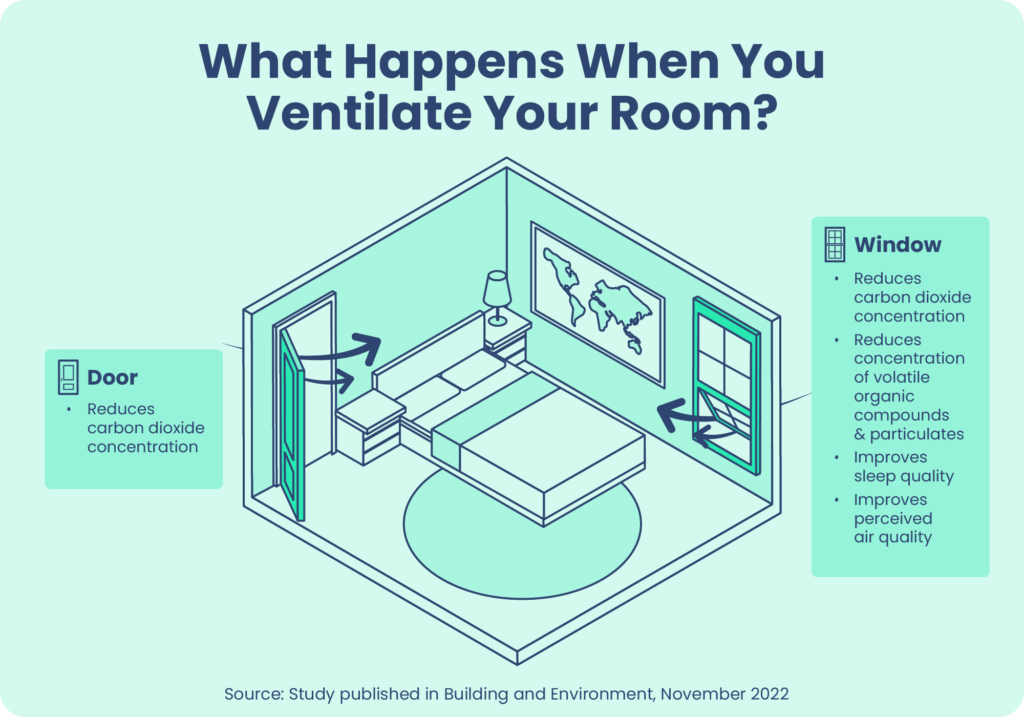Sleep is a vital aspect of our lives, with its quality directly impacting our overall well-being. Certain factors affect the quality of our sleep, and one of these is ventilation. While an open window may offer potential benefits for a good night’s rest, many of us have a tendency to keep our windows closed. In this article, we will explore the reasons behind this behavior and whether our choice to keep the window closed is hindering our ability to achieve optimal sleep.
The Importance of Ventilation for Sleep
Ventilation plays a crucial role in promoting good sleep. When we sleep, our bodies engage in various physiological processes such as temperature regulation and toxin elimination. Adequate ventilation allows for the exchange of indoor and outdoor air, ensuring proper airflow and oxygenation in our sleeping environment. This can have several positive effects on our sleep quality:
- Improved air quality: Opening a window allows fresh outdoor air to enter our room, diluting indoor pollutants such as dust, carbon dioxide, and volatile organic compounds (VOCs), which can accumulate during the day and impact our respiratory health.
- Regulated temperature and humidity: Ventilation helps control the room temperature and humidity levels, creating a more comfortable sleep environment. Optimal temperature and humidity promote deeper, uninterrupted sleep.
- Reduced allergens: Increased airflow helps remove allergens like pollen, pet dander, and mold spores, which can trigger allergies and disturb our sleep.

Credit: www.sleepfoundation.org

Credit: health.clevelandclinic.org
Reasons for Keeping the Window Closed
Despite the potential benefits, many people choose to keep their bedroom windows closed while sleeping. There are several reasons behind this behavior:
- External noise: If you live in a noisy environment, such as near a busy road or in a crowded area, opening the window can expose you to unwanted noise pollution that can disrupt your sleep.
- Safety concerns: Some individuals may feel unsafe leaving their windows open, especially if they live on upper floors or in areas with a high crime rate.
- Pollutants and allergens: Opening the window may introduce outdoor pollutants and allergens, such as pollen, dust, or even insects, which can trigger allergies or respiratory issues.
- Inconsistent temperature: Depending on the climate, leaving the window open can lead to temperature fluctuations throughout the night, potentially causing discomfort and sleep disturbances.
- Privacy: Many people prefer to keep their windows closed for privacy reasons, especially if their bedroom faces a busy street or neighboring properties.
Optimizing Sleep Environment with Closed Windows
If you choose to keep your bedroom window closed while sleeping, there are still ways you can optimize your sleep environment:
- Invest in an air purifier: An air purifier can help eliminate indoor pollutants, improving the air quality in your room. Look for one with a HEPA filter for optimal effectiveness.
- Use curtains or blinds: Investing in thick curtains or blinds can help block out external light and minimize visual distractions, creating a darker sleeping environment.
- Choose the right bedding: Opt for breathable materials like cotton or bamboo, which promote ventilation and reduce overheating during sleep.
- Control room temperature: Utilize fans or air conditioning units to maintain a comfortable temperature in your bedroom. Keep in mind that a slightly cooler sleep environment is generally more conducive to better sleep.
- Practice good sleep hygiene: Establish a bedtime routine, limit screen time before bed, and create a calm and relaxing atmosphere in your bedroom to promote quality sleep.
The Right Balance for Optimal Sleep
While an open window may provide certain benefits for sleep, it is crucial to strike a balance that works for you. Consider your specific circumstances, including noise levels, air quality, and personal preferences. Experiment with different approaches to find the optimal sleep environment that promotes your well-being.
In conclusion, ventilation is important for achieving quality sleep, but there are valid reasons why some individuals choose to keep their windows closed. Understanding the potential benefits and drawbacks can help you make an informed decision about the best approach to optimize your sleep environment. Whether you choose to open or keep your window closed, taking additional steps to enhance your sleep environment will ultimately contribute to a more restful and rejuvenating night’s rest.
Frequently Asked Questions For Open Window May Be Better For Sleep But We Keep It Closed
Why Is It Important To Keep The Window Closed While Sleeping?
Keeping the window closed while sleeping is important because it helps minimize noise pollution, maintain a comfortable temperature, and keep out insects.
Does Opening The Window Improve The Quality Of Sleep?
Opening the window can improve sleep quality by allowing fresh air circulation, reducing stuffiness, and providing a natural cooling effect.
Can An Open Window Lead To Disturbed Sleep?
An open window may lead to disturbed sleep due to increased noise levels, potential allergens entering the room, and variations in temperature that can affect comfort.
What Are The Benefits Of Having A Closed Window During Sleep?
Having a closed window during sleep helps create a quieter and more serene environment, prevents outdoor pollutants from entering, and offers better control of temperature and ventilation.
Leave a Reply